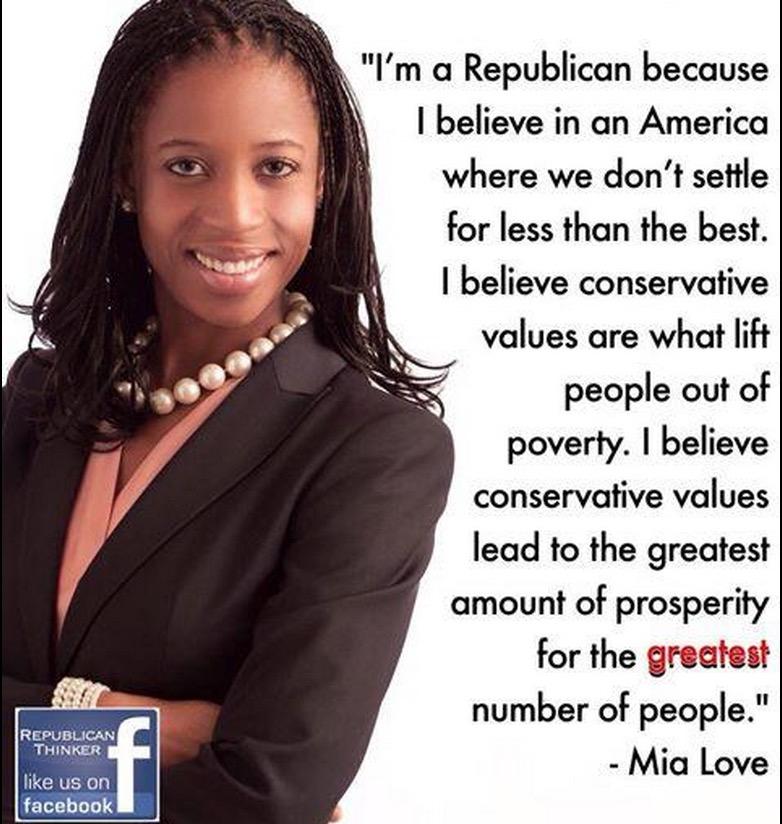And yet again, the leftist Huffington Post takes a racial swipe at a black female conservative. Mia Love, who became the first female African-American elected to congress in Utah is described by the Huffington Post only as she looks black, but her policies are red (aka conservative). Is this supposed to mean that blacks, especially female blacks aren’t allowed to be conservative? Must Mia Love and other blacks stay on the liberal progressive plantation or they lose their ‘blackness’ or something? The HuffPO also describes Mia Love as a ‘paradox’.
Want to know why racial tensions in this country have risen so much in the last six years? It’s not just because of Obama and his race hustling. It’s mainly because of liberal trash like this that deems female black conservatives as not really black. Progressive liberals in the media are terrified of conservatives like Mia Love. It makes their GOP is the party of ‘old white man’ that much more ridiculous every day. Great investment there AOL.

|
| Huffington Post on Mia Love: She Looks Black, but Her Politics Are Red |
|---|
To many African Americans and other individuals engaged in politics who followed Mia Love’s House candidacy up to her historic victory, she is a paradox. As a black, female Mormon, her conservative ideals are deemed peculiar as she begins her office in the House of Representatives while balancing a triad of oppressive social constructs that are leveled against her. Not only have blacks historically and continually had to battle for their right to coexist as equals in U.S. society, but women have similarly pushed against a glass ceiling. Even today, women still struggle for equal pay, equal rights and equal protection under the law in the workplace. Mia, as a black female, represents one of the most discriminated-against racial groups in the country. To a degree, the same can be said for her Mormon identity, as the LDS faithful endured bitter hatred and state-sanctioned domestic terrorism in Missouri and Illinois in the 1800s. Mormons remains grossly misunderstood and often unfairly judged with respect to their religious views, while mainline evangelical traditions continue to wield Christian privilege at the expense of “fringe” religions like Mormonism. How does a black, female conservative and Latter-day Saint manage to negotiate so many foreboding white contexts?
Love’s political convictions show a strong support for values that do not necessarily represent her interests as a member in any of these oppressed groups. For example, blacks are not doing well with respect to education, economics and health outcomes, while women still trail behind in salary and significant positions of power, and conservative politics are not typically known to aid these groups in such key issues. These actualities of Mia’s existence seem to be diametrically opposed to her values that are grounded in a white, male, Christian context. She appears publicly unhampered by the daily grind of white racism that affects other racial minorities within the United States. Unlike most of them, Mia gets to walk through the hallowed doorways of white institutions controlled by elite, powerful men. She is allowed to pass through in her black, female body with the understanding that she must not see, speak or openly advocate for anything related to race or gender — an unholy compromise. Hence, she might look black, but her politics are red. This is one way white privilege is reproduced at the legislative level of government. In fact, Mia, along with other notable black conservatives such as Allen West, Michael Steele, Amy Holmes, Alan Keyes and Tom Scott, subscribe to a party that rejects any notion of systemic racism as a central cause of black suffering within its basic tenets of individualism. What many conservatives fail to recognize is that individuals are connected to larger groups, and the group in which these Black Republicans belong persistently lags behind in every major social indicator.